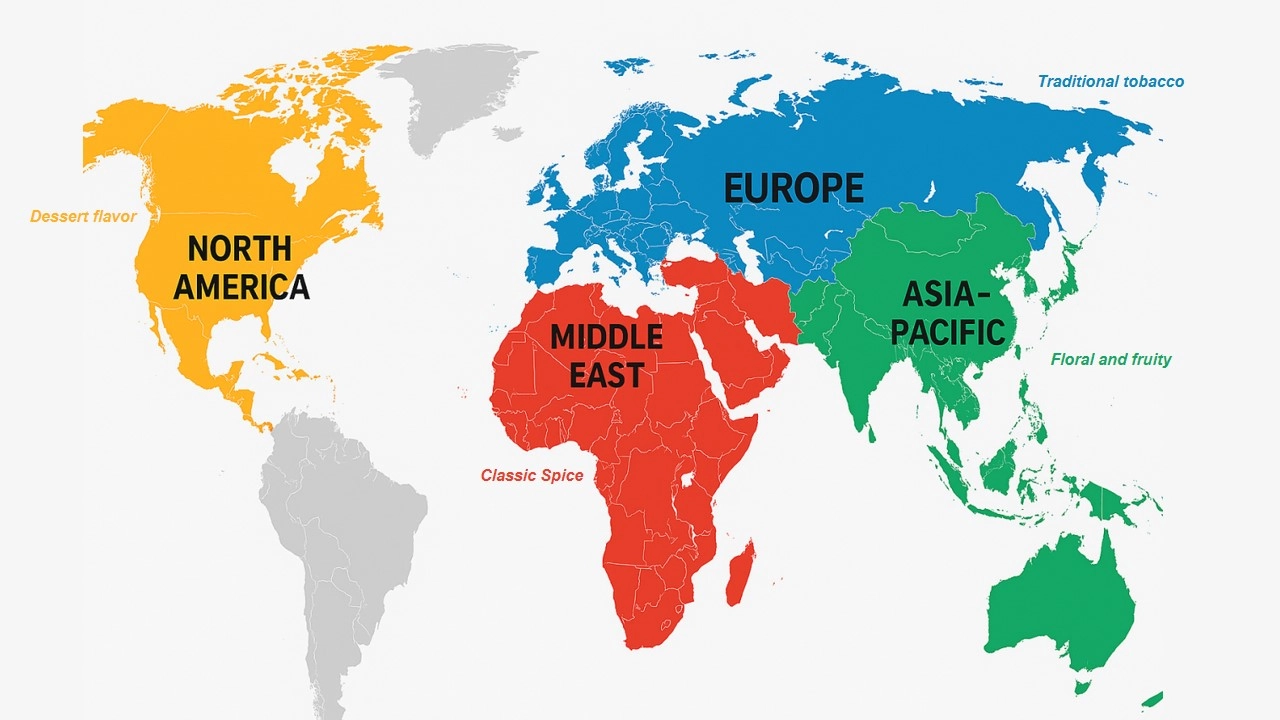According to data from IMARC Group, the global e-cigarette market is projected to reach $24.6 billion in 2024. Driven by rising health consciousness, consumer demand for diverse flavor options, and the rapid expansion of online retail channels, the e-cigarette flavor market is expected to grow at a compound annual growth rate (CAGR) of approximately 13.09% from 2025 to 2029.
As market demand continues to surge, how can e-cigarette flavor suppliers seize emerging opportunities and adapt to regional preferences?
Global distribution of e-cigarette flavors
The demand and preference for e-cigarette flavors in different regions are usually related to their cultural background, popular trends and local eating habits. Therefore, manufacturers usually consider the original cultural flavor elements when innovating flavor design. Innovative flavors are not just copying, but often combined with the taste habits and cultural preferences of local users.

North America: Growing Demand for Dessert-Inspired and Social Flavors
In North America, e-cigarettes have gained popularity in social settings such as college campuses, parties, and niche bars. For consumers who value individuality and lifestyle experiences, vaping is a way to explore unique and unconventional flavor blends while enjoying a lively social atmosphere.
American consumers show strong preferences for dessert-inspired and smoked flavors like popcorn, marshmallow, and chocolate pie. Seasonal and occasion-based flavors, such as pumpkin spice latte, are also trending, especially among younger audiences who chase novelty and meaning in their choices.
Europe: Fusion of Classic Tobacco and Trendy Fruit Flavors
European consumers place high importance on product safety, ingredient compliance, and convenience — influenced by strict local regulations. Despite a strong cultural affinity for traditional tobacco flavors, there is a growing interest in fruit-based and innovative flavor combinations.
Eco-friendly packaging and refillable e-cigarette devices are gaining traction across the continent. Additionally, nicotine-free and certified products are in higher demand, particularly in health-conscious markets. Luxury design and premium-quality devices are also popular among European users.
Middle East: Innovation with Classic and Cooling Spices
In the Middle East, classic flavors such as double apple, grape, mint, and honeydew melon remain highly popular. These long-standing favorites are deeply embedded in local flavor culture.
Flavors inspired by spices — including cinnamon and anise — and cooling sensations are in high demand due to the region's hot climate. Fruity blends like mango and passion fruit, often combined with mint for a refreshing twist, enhance the exotic appeal favored in this market.
Asia Pacific: Tradition Meets Technology in Flavor Innovation
The Asia-Pacific region reflects a rich blend of traditional herbal preferences and modern innovation. Each sub-market demonstrates distinct characteristics:
- Japan & South Korea: Emphasis on compact, high-tech devices and subtle flavors.
- Thailand & Vietnam: Demand for tropical fruit and spice-infused blends.
- India & Pakistan: Strong interest in bold fruit flavors, often with mint or spice combinations.


B2B Strategies: How E-Cigarette Flavor Suppliers Can Innovate and Scale
Technological Adaptation: Customization from Formula to Manufacturing
To meet regional challenges, especially in environments like Southeast Asia, technical innovations are essential:
Southeast Asian Market - Adaptability to Hot and Humid Environments:
- Oxidation Control: Use of a composite antioxidant system (Vitamin E 0.1% + Rosemary Extract 0.05%) extends shelf life by 40% compared to traditional BHT solutions.
- Moisture Resistance: Spray-drying and microencapsulation reduce water content to ≤3%, improving product stability threefold in RH85% conditions.
- Thermal Stability: Adding 0.02% tea polyphenol palmitate enhances flavor retention by 65% under 60°C stress tests
Compliance Substitution: Flavor Molecule Optimization for Regulation
Under EU TPD regulations, suppliers must ensure ingredient compliance without compromising flavor quality. This involves:
A. Alternative Ingredient Matrix
|
Prohibited Ingredient |
Alternative |
Key Benefits |
Application Tips |
|
Vanillin |
Ethyl Vanillin |
30% stronger aroma, lower threshold |
Use 20% less in dessert flavors |
|
Cinnamaldehyde |
Hydrogenated Cinnamyl Alcohol |
65% less irritation,shorter fragrance duration |
Reinforce with cinnamyl acetate |
|
Eugenol |
Isoeugenol Methyl Ether |
80% faster metabolism |
Ideal for tobacco blends |
B. Cost Optimization Strategy
Tiered Replacement Plan: Full replacement (15–25% premium) vs. partial replacement (5–8% premium).
Ingredient Synergy: Restore over 90% of original flavor using 3–5 compliant ingredients.
Flavor Innovation: Building the “Olfactory Economy”
Methodology for Flavor Design
- Fragrance Roulette System: Break flavor profiles into top (volatile esters), middle (aldehydes/ketones), and base notes (lactones).
- Sensory Omics Technology: Identify key aroma compounds using GC-O-MS analysis — e.g., 2,5-dimethylpyrazine contributes 73% to tobacco flavor.
Popular Flavor Systems
Cooling Matrix: Menthol (30%) + WS-3 (15%) + Menthyl Acetate (55%)
Layered Tobacco: Solanone + Megastigmatrienone + Damascena + β-Damascenone
Fruity Explosion: Cis-3-Hexenal + Ethyl Butyrate + γ-Decanoic Acid
Market Forecast and Regional Outlook
Globally, the e-cigarette flavor market is divided into four key regions: North America, Europe, Asia Pacific, and the Middle East. North America currently dominates and is expected to retain its lead. Europe follows closely and is projected to grow steadily.
Asia Pacific is anticipated to experience the highest CAGR due to rising adoption in countries such as China, India, and Japan. While Africa currently has a smaller market size, it is expanding rapidly and is likely to maintain strong growth momentum in the coming years.
Contact us to customize market-exclusive solutions!
2025.01.06

